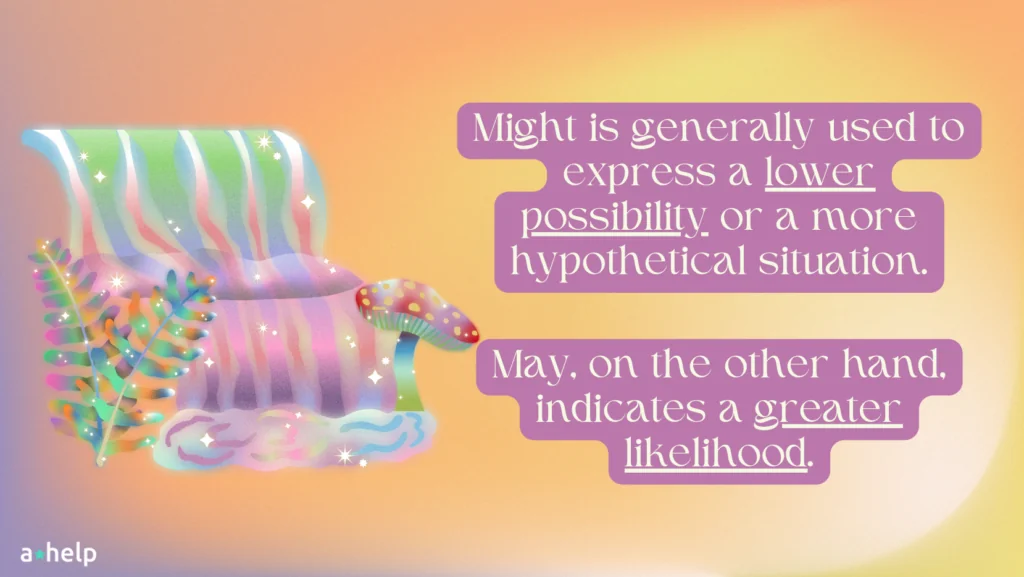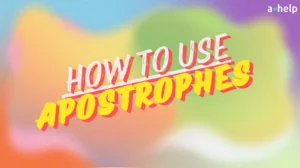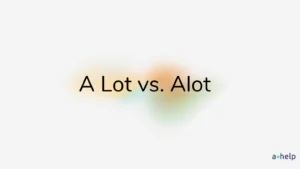Today, we’re going to explore auxiliary verbs. These little helpers are necessary because they work alongside main verbs to create different verb tenses, moods, and voices. Auxiliary verbs do a lot of the heavy lifting in sentence construction, helping to clarify when actions happen and the conditions under which they occur.

✅ AI Essay Writer ✅ AI Detector ✅ Plagchecker ✅ Paraphraser
✅ Summarizer ✅ Citation Generator
One common point of confusion in English is the difference between the auxiliary verbs “might” and “may.” Both words contribute to expressing possibility or permission, but they’re often used interchangeably when they shouldn’t be. Understanding when to use each can be a bit tricky, but we’re here to help you out.
Using “May”
“May” is an auxiliary verb that we use all the time in English grammar, and it’s pretty handy for showing what’s possible or for asking permission in a polite way. Let’s break it down a bit so you can see just how versatile “may” can be.
First off, when we talk about possibilities, “may” comes into play by suggesting that something might happen. For example, if you say, “It may rain later,” you’re not sure if it will rain, but it’s a possibility.
On the flip side, “may” is also how we ask for or give permission formally. If you need to leave the room and want to be polite, you might ask, “May I leave the room?” It’s a respectful way to seek permission, and it’s likely how you’d hear it used in formal settings or in the classroom.
Here are a few examples to help you get a feel for using “may”:
- May I use your phone? – This is a polite way of asking if you can use someone’s phone.
- We may visit Grandma this weekend if she feels better. – This means the visit will happen if everything goes well.
- Yes, you may start now. – This is a formal way of telling someone they can begin.
- There may be more guests than we expected. – Here, you’re considering that the number of guests might increase.
- May I have the window seat, please? – Again, it’s a courteous way to ask for something you want.
Using “Might”
“Might” is another auxiliary verb that helps us talk about possibilities, but it suggests that something is even less certain than “may.” It’s useful for expressing doubt or speculation, especially when the likelihood of something happening is pretty slim.
When you compare “might” to “may,” think of “might” as being more hesitant. If “may” says there’s a fair chance something will happen, “might” tiptoes around and hints that the chance is there, but it’s not strong. This subtle difference can change the tone of a sentence, making it sound less assertive and more speculative.
Let’s look at some examples to see how “might” works in sentences:
- We might go to the park, but it looks like it could rain. – Here, “might” shows that the plan is very tentative because of the weather.
- She might come to the party if she gets off work early. – This sentence expresses uncertainty about her attending.
- You might want to check that again. – This is a soft suggestion, indicating that checking again is a good idea but not mandatory.
- He might get the promotion, depending on the final review. – “Might” suggests that the promotion is uncertain and depends on future conditions.
- They might travel to France next year if they save enough money. – This shows that the trip is just one possible outcome among others.
Comparing ‘Might’ and ‘May’
In English, the auxiliary verbs “might” and “may” are often used interchangeably, but they serve different purposes and convey varying degrees of likelihood.

Might suggests that something could happen, but the odds are not very strong. It’s often used in situations where the outcome is uncertain or when speculating about hypothetical situations.
May is used to express permission in a formal context and possibility that is more probable than with “might.”
Here’s a simple table to break down the differences:
| Point | Might | May |
|---|---|---|
| Probability | Less likely, more speculative | More likely, somewhat certain |
| Permission | Rarely used for permission | Commonly used to grant formal permission |
| Formality | Informal and formal | Mostly formal when granting permission |
| Usage | Speculative, uncertain outcomes | Probable outcomes, formal permissions |
Examples:
- Might: “He might go to the movies tonight if he finishes his work.”
- May: “You may begin your exam now.”
Whether you’re writing an essay or speaking in a meeting, choosing between “might” and “may” correctly can clarify your intentions and improve the clarity of your communication. Now, let’s remember the rules we talked about and complete the following exercises.
FAQ
Follow us on Reddit for more insights and updates.





Comments (0)
Welcome to A*Help comments!
We’re all about debate and discussion at A*Help.
We value the diverse opinions of users, so you may find points of view that you don’t agree with. And that’s cool. However, there are certain things we’re not OK with: attempts to manipulate our data in any way, for example, or the posting of discriminative, offensive, hateful, or disparaging material.